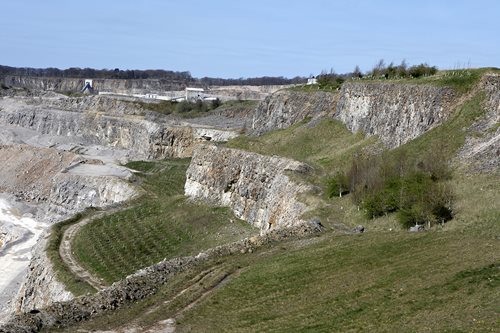 The importance of mineral extraction in designated landscapes is highlighted in a new document from the Mineral Products Association (MPA).
The importance of mineral extraction in designated landscapes is highlighted in a new document from the Mineral Products Association (MPA).
Minerals in Designated Landscapes reiterates the unique relationship between the country’s protected landscapes and the geology that helped to shape them which provides an array of minerals essential for construction and manufacturing.
The document follows the MPA’s recent contribution to a Government policy paper consultation on National Parks and Areas of Outstanding Natural Beauty (AONBs) which is a response to proposals set out in 2019’s independent Glover Review.
Neither the Glover Review nor the Government’s policy paper make any significant reference to mineral extraction, despite the fact that geology dictates that almost half the country’s quarries are located in designated landscapes or within 5 km of their boundaries.
The mineral products industry makes a vital contribution to rural economies in designated landscape areas and are a huge source of public income in some counties. For example, quarries around the Peak District National Park contribute more than £5 million in business rates alone, while Derbyshire County Council estimates that up to £50 million is paid annually in salaries to skilled employees in the minerals industries in Derbyshire, with most of these jobs in rural areas where employment can be scarce.
Working the land for mineral has been a feature of landscapes that are now designated as National Parks and AONBs for centuries. Indeed, many popular attractions inside these areas were created through quarrying, from country parks and wildlife reserves to nature trails and off-road cycleways.
The MPA document outlines the continued need to supply minerals from within designated landscapes, recognition of the need to minimise any adverse effects of mineral extraction, the delivery of benefits to communities through quarry restoration and biodiversity, and a continued commitment to operate in line with the requirements of national planning policy and environmental legislation.
Mark Russell, the MPA’s Executive Director for Planning and Mineral Resources said: “National Parks and AONBs are working landscapes for millions of people across the country as well as places to be cherished for their beauty. Mineral extraction must not be overlooked as minerals can only be worked where they lay in the ground and these operations make a unique contribution to rural economies, besides providing a wide variety of essential mineral resources that the country depends on for construction, manufacturing and industrial end-uses.
“That’s neither fully understood nor appreciated by the Government and there would be a significant adverse economic impact if future policy changes failed to properly consider the important role of mineral producers in designated landscapes and their settings. The limited geographic distribution of some mineral resources means it would be impractical to provide all the minerals society requires solely from outside National Parks and AONBs or their immediate surrounding areas.
“There are already stringent standards for operating in areas like National Parks. National planning policy already includes additional checks and balances to ensure that any mineral operations are properly scrutinised to ensure they meet the highest operational standards and are able to demonstrate exceptional circumstances that extraction and production is in the national interest.”
Minerals in Designated Landscapes can be downloaded from the MPA website: https://mineralproducts.org/MPA/media/root/Documents/2022/MPA_Designated_Landscapes_Position_Statement_2022.pdf
Ends.
About the Mineral Products Association:
The Mineral Products Association (MPA) is the trade association for the aggregates, asphalt, cement, concrete, dimension stone, lime, mortar and silica sand industries. With the merger of British Precast, and affiliation of the British Association of Reinforcement (BAR), the British Calcium Carbonate Federation, the Cement Admixtures Assocation (CAA), CONSTRUCT, Eurobitume, MPA Northern Ireland, MPA Scotland and the UK Quality Ash Association (UKQAA), it has a growing membership of 520 companies and is the sectoral voice for mineral products. MPA membership is made up of the vast majority of independent SME quarrying companies throughout the UK, as well as the 9 major international and global companies. It covers 100% of UK cement and lime production, 90% of GB aggregates production, 95% of asphalt and over 70% of ready-mixed concrete and precast concrete production. In 2018, the industry supplied £16 billion worth of materials and services to the Economy. It is also the largest supplier to the construction industry, which had annual output valued at £172 billion in 2018. Industry production represents the largest materials flow in the UK economy and is also one of the largest manufacturing sectors.